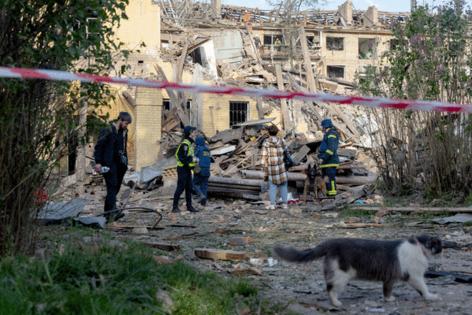Zelenskyy resists Trump pressure after Russian strike hits Kyiv
Published in News & Features
Ukrainian President Volodymyr Zelenskyy reinforced his rejection of concessions to Russia as the war-battered nation was hit by the biggest air strike this year and U.S. President Donald Trump piled pressure on Kyiv to accept a peace deal.
During a visit to South Africa that he cut short after the overnight missile and drone attack, the Ukrainian leader said his openness to potential talks with a government waging war against his country already represents a compromise. He repeated his demand for a full truce.
“We can’t talk about red lines without an unconditional ceasefire,” Zelenskyy told reporters in Pretoria on Thursday alongside South African President Cyril Ramaphosa. He said earlier he would cut his visit short after an overnight Russian strike killed at least nine people in Kyiv.
For his part, Trump condemned the Kremlin attack. “Not necessary, and very bad timing,” he posted on his social media platform as he urged Russian President Vladimir Putin to “STOP!”
Zelenskyy’s wartime diplomacy thousands of miles from the battlefield occurred at a difficult moment, with the U.S. president returning to a barrage of accusations against his Ukrainian counterpart, again blaming him for blocking a deal that Kyiv’s supporters say favors Putin.
Zelenskyy was careful not to criticize Trump, who lashed out at him on social media a day earlier. The U.S. president responded to Zelenskyy’s vow never to recognize Russian sovereignty over Crimea, which the Kremlin annexed illegally in 2014. The U.S. is prepared to recognize Moscow’s control of the Black Sea territory as part of an agreement, Bloomberg has reported. Trump said a proposed deal wouldn’t ask Ukraine to do so.
It was the first visit by a Ukrainian leader to South Africa. Zelenskyy has struggled to recruit nations of the Global South to Kyiv’s cause — a project that’s taken on renewed urgency with U.S. support. The meeting followed Ramaphosa’s phone call with Putin and Trump on ending the war.
But the discussions were overshadowed by the overnight attack, in which Kyiv bore the brunt of aerial strikes, leaving more than 70 injured, Interior Minister Ihor Klymenko said on Telegram Thursday.
“Unfortunately, there is significant destruction,” Zelenskyy said in a statement posted to social-media platform X, adding that 44 days had passed since Kyiv agreed to a U.S.-proposed ceasefire. “Rescue operations are ongoing, and the rubble of residential buildings is being cleared.”
Russia fired 70 missiles of various types as well as 145 drones against Ukraine in the overnight barrage, with the main bulk of them aimed at the capital, the country’s Air Force said. Ukraine relied on F-16 and Mirage jets provided by its western allies to help fend off the attack, downing 48 missiles and 64 Shahed drones.
Zelenskyy ordered Defense Minister Rustem Umerov to open a channel to allies to discuss air defense. Kyiv needs to bolster its ability to down ballistic missiles, Air Force spokesman Yuriy Ihnat told local television.
Poland’s air force scrambled fighter jets in what has become a standard response to a major aerial strike on its neighbor since Putin ordered Russia’s full-scale invasion of Ukraine more than three years ago.
“Putin only demonstrates the desire to kill,” Zelenskyy’s top aide, Andriy Yermak, posted to X on Thursday. “The fire must cease. Strikes against civilians must stop.”
Returning immediately
Elsewhere, two people were injured in the region of Kharkiv in the east as well as another two in Zaporizhzhia in the south, while an industrial facility was damaged in Pavlohrad in the Dnipropetrovsk region in central Ukraine, without casualties. The strike also reached Zhytomyr region in the north and Khmelnytskyi in the west.
The Russian Defense Ministry said on Telegram that its air defense had downed 87 Ukrainian drones overnight, including two over the Moscow region.
The escalation in fighting that’s dragged on for more than three years compounded tensions as Ukraine and its European allies seek to slow Trump’s rush for a deal over worries that it will sacrifice European security. Signals from Washington this week show no sign that the lurch in U.S. policy toward Moscow had changed.
Vice President JD Vance said Wednesday in India that any potential deal would have to include “some territorial swaps” and the border may not wind up reflecting the front lines as they stand now. He said the U.S. has issued a “very explicit proposal” to Russia and Ukraine and warned it could walk away from the deal if they don’t agree.
European allies are insisting that a ceasefire and clarity over security guarantees for Ukraine must precede any agreement that involves negotiations over territory, according to people familiar with the matter.
At a meeting in Paris last week, U.S. officials presented Europe and Ukraine with a new proposal to end the war that would effectively freeze the conflict largely along existing battle lines, Bloomberg reported previously. The U.S. is also willing to acknowledge Russia’s occupation of Crimea, which is internationally recognized as Ukrainian territory, and to ease sanctions on Moscow as part of any potential deal.
“Yesterday’s Russian maximalist demands for Ukraine to withdraw from its regions, combined with these brutal strikes, show that Russia, not Ukraine, is the obstacle to peace,” Ukrainian Foreign Minister Andrii Sybiha posted to X on Thursday. “Moscow, not Kyiv, is where pressure should be applied.”
---------
With assistance from Olesia Safronova.
©2025 Bloomberg L.P. Visit bloomberg.com. Distributed by Tribune Content Agency, LLC.







Comments